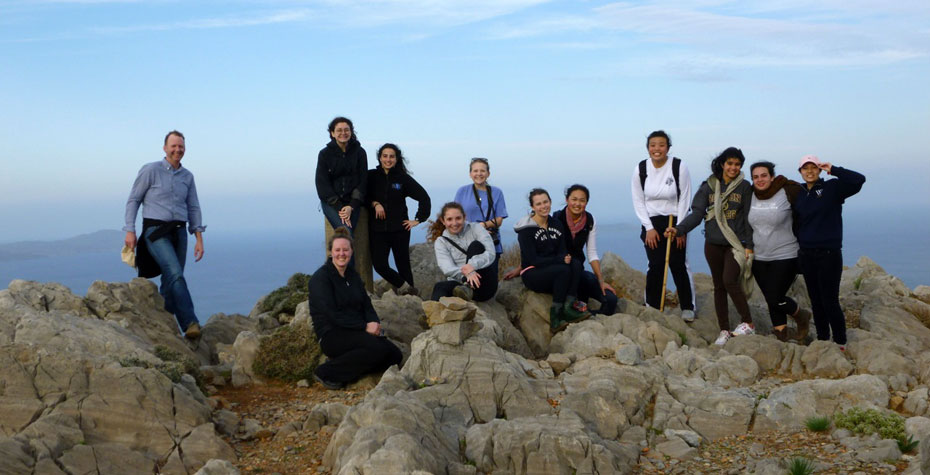From Exploring the Inner Workings of Cancer Cells to Exploring the Ancient Shorelines of Crete, Students Expand Horizons during Wintersession

To the casual observer, Wellesley College may have seemed quiet during Wintersession, but a closer look would reveal a range of endeavor that speaks volumes.
In addition to the fifth annual Madeleine K. Albright Institute for Global Affairs Wintersession program, the second annual Three College Collaboration Wintersession program, and the customary in-season work of varsity winter athletes during this time, a host of other students and faculty were engaged in intellectual pursuits on campus and off.
For example, around 20 students maintained residence at Wellesley during Wintersession in order to pursue laboratory research at the Science Center or at other facilities in the region.
Chemistry major Michelle Brann ’15, for instance, stayed to work on prostate cancer research with Nan Walsh Schow ’54 and Howard B. Schow Professor in the Physical and Natural Sciences and Professor of Chemistry Adele Wolfson. As Brann explains (vastly simplified), “One reason for difficulty in treatment is that through the course of the cancer, cells change from being androgen sensitive to androgen insensitive. It is currently unclear how this change occurs….” An enzyme had been discovered with the potential for treatment of the insensitive cells. “The purpose of our experiment,” says Brann, “was to first confirm that the new prostate cancer 3 cell lines PC3-AR (androgen responsive) and PC3-T (androgen insensitive) responded as predicted by treating them with androgens.”
Another junior, neuroscience major Teja Reddy, pursued cancer research of a different kind at Edwin L. Steele Laboratory for Tumor Biology at Massachusetts General Hospital while residing on campus during Wintersession. Her research group is examining whether normalizing the cancer tumor vasculature by using a particular combination of drugs can increase the effectiveness of treatment in a common type of liver cancer. “The work I conducted during Wintersession gave me a head start on a project I will be conducting for BISC 350 credit as well as a future publication,” says Reddy. “And working in this lab has opened my eyes to other potential research avenues to enter for graduate study.” For this project, her on-campus research advisor is Assistant Professor of Biological Sciences Louise Darling, and she has worked with Class of 1966 Associate Professor of Neuroscience Marc Tetel since her first year.
Several students were on campus working with Professor of Biological Sciences Marianne Moore, preparing specimens of seal teeth, both modern and prehistoric, that will be assessed to determine levels of toxins in the environment when the teeth were growing.
Investigations without lab coats were also underway on campus, as the second Freedom Project Wintersession Institute on Liberty and Social Policy took place at Wellesley under the direction of Deffenbaugh de Hoyos Carlson Professor in the Social Sciences and Professor of Sociology Thomas Cushman.
Thirteen Adam Smith Fellows from different disciplines and viewpoints took part in the program to explore key issues and questions related to freedom. These students had intensive seminars and discussions with visiting professors and journalists on topics such as anarchist feminism, libertarian solutions to poverty, the role of morality in markets, and the unanticipated consequences of state interventions in social and economic affairs.
Taking investigations farther afield, nine students accompanied Associate Professor of Psychology Nancy Genero to South Carolina to observe single-sex public school classrooms in the Greenville-Spartanburg area, and collect and compile data.
For PSYC321: Community Psychology with Wintersession Applied Research, a full semester of coursework follows the January data collection in order to understand single-gender instruction from the perspective of teachers and students. This unique course enables students to hone their observation research skills, work with a substantially large dataset, and network with single-gender educators, researchers, and program directors. Genero says, “As students begin to document and describe their experiences in the schools, it is so gratifying to hear them articulate their own research questions. Developing their ideas and making use of the data they collected during Wintersession is a creative and time-consuming process. We will work together the rest of this semester to figure it all out... and we're very excited about it!”
Meanwhile, Wintersession courses took students to Central America and various European capitals, with two separate courses going to Greece. Professor of Anthropology Anastasia Karakasidou's course ANTH310: Wintersession in the Southern Balkans traveled to Salonica (Thessaloniki) in Greek Macedonia, the birth region of both Philip II and Alexander the Great, to examine both nationalism and the reception of antiquity in modern Thessaloniki.
And 12 students—including majors in classical studies, history, art, and economics, to name a few—journeyed with Associate Professor of Classical Studies Bryan Burns to Crete for the course CLCV226: Crete through the Ages. Burns is an archaeologist who studies Mediterranean exchange in the Late Bronze Age and conducts fieldwork in Greece.
Over three weeks the group explored the largest island in the Aegean Sea, visiting a variety of sites, cities, and all four coastlines. They studied the long span of history, with emphasis on the art and architecture of the Minoan civilization (3000-1000 BCE), and they kept an exhaustive blog of their experiences. The photo here was posted by Caitlin McGrail '14, who wrote: “We ourselves were archaeologists today when hiking up to the Peak Sanctuary of Petsofas, where thousands of pottery fragments serve as visual evidence for the many ancient pilgrimages to this sacred site. Investigating and imagining what the sherds originally belonged to was a fun and exciting exercise!”
Reflecting on the trip, Burns says, “Our many experiences enabled us to consider aspects of local identity–Cretan identity–from different perspectives. How history, monuments, landscape, food (so much good food!) all contribute to people's sense of home, pride, and belonging."
This is just a sampling of the Wintersession pursuits undertaken by Wellesley students. The College welcomes them back for spring semester with these new experiences as part of their Wellesley identity!
